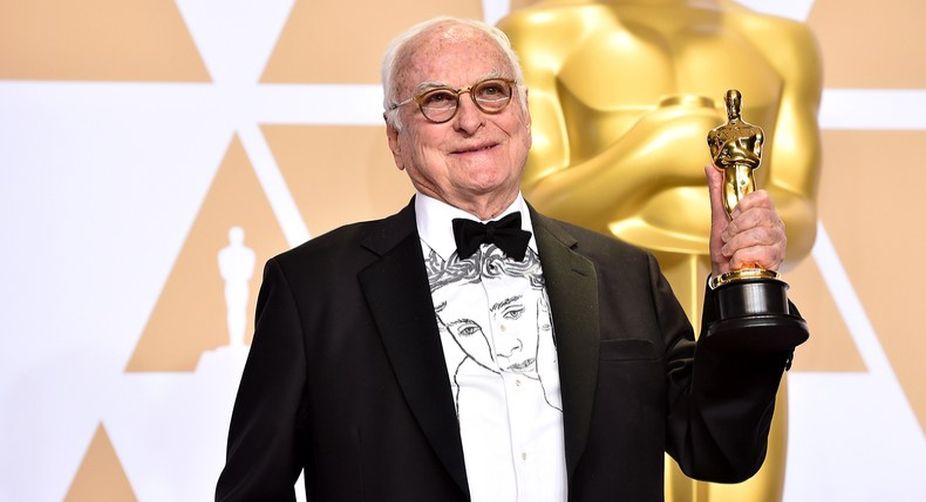‘Deewaar’ turns 50: Iconic film to get free screening in Mumbai!
Celebrate 50 years of Yash Chopra's 'Deewaar' with a special screening at Regal Cinema, Mumbai, on February 1. Free entry, first-come, first-served.

Director Guillermo Del Toro (centre) with the cast and crew of The Shape of Water after winning the Best Film award.
Very few in India had expected Sridevi, who had passed away just a few days ago, to be hastily included in the 90th Academy Awards at the Dolby Theatre in Los Angeles. It was as surprising as the Academy decision 17 years ago to walk into the high security zone of a hospital in Kolkata to record an unforgettable acceptance speech by Satyajit Ray after he had been conferred a Lifetime award and was put in the company of all-time greats in world cinema. These were just glimpses of the conscience that has kept the credibility of the Oscars alive for nine decades.
There have been glitches and goof-ups – the most striking of these having occurred last year with the horribly messed up announcement of the Best Film. That has done nothing to dent the excitement of the ritual that has been reinforced by the combined impact of remarkably well-conceived presentations and commitment to its basic principles.
Advertisement
That the Academy has a voice that is not determined by the opinions of national leaders was evident from the top prizes that went to a film made by a Mexican director just when there is a determined effort to raise a wall against the neighbouring country. The flood of nominations for The Shape of Water was, if anything, a testimony to the power of cinema in sustaining the spirit of harmony and togetherness that has created the impression of Hollywood as a happy family despite the professional rifts and rivalries.
Advertisement
This is a family that is seen to be charitable and graceful both in victory and defeat. But for compelling circumstances, all those figuring in the nominations are found to be quite tense as the presenters arrive on stage and cameras focus on tense expressions.
While the winner is predictably delighted, the losers have a smile that is quite genuine for the simple reason that a nomination is a good enough reward that leads to serious attention as well as a nudge to the commercial prospects for the film. This is also a family that can laugh at itself without anyone taking offence — that is why the host can taunt the makers of What Women Want with a query on why it had to star Mel Gibson.
There were, of course, valid reasons for focusing on the cause of women that has been the crux of the Times Up and Me Too movements leading up to the Oscar ceremony. The person who was at the centre of the allegations of sexual misconduct that have been piling up was conspicuous by his absence, reflecting the mood all around.
On the other hand, Meryl Streep, who made some bold observations in an interview on the uproar and had been promptly greeted by adverse tweets from a newly elected President (that she was an “overrated actress”), walked the Red Carpet with the dignity that she has been carrying through her outstanding performances and personal demeanour.

She found warm endorsement not only from the host but from everyone in the theatre as she celebrated her nomination for the best actress award in The Post. It didn’t matter that she lost out to Frances McDormand who created a rare moment of pride with her impassioned acceptance speech for her performance in Three Billboards Outside Ebbing, Missouri, but more so when she asked all female nominees to rise from their seats.
These are moments that are difficult to forget. Both Sridevi and Shashi Kapoor have had little to do with the Oscars during the long years that they have worked in Bollywood. But the manner in which they were included in the In Memoriam section signalled the sensitivity that is woven into the joyous ambience.
It was perhaps a coincidence that Shashi Kapoor was remembered just when James Ivory with whom he had worked in Householder, Shakespearewallah, Heat and Dust and many more was virtually recalled from retirement at the age of 89 for the award-winning screenplay he had written for Call Me By Your Name.
But the director who had fallen in love with India displayed an amazing sense of timing and tenderness with a hand-drawn version of a still with his leading actor printed on his shirt. Timothee Chalamet may not have finally walked away with the statuette just like Daniel Day-Lewis and Denzel Washington who lost out to Gary Oldman. But it was a gesture that Timothee and no one else in the theatre would probably forget.
What does all this mean for the organisations that mount the spate of awards functions in India? Like the Oscars, the ceremonies in different filmmaking centres bring an overwhelming emphasis on entertainment and glamour unless there are political and other interests that now seem to claim more attention in the southern states.
But while Indian ceremonies thrive on spectacular thrills, the Oscars have remained the reference point without much prospect of an erosion of excitement that builds up well before the actual event. This is rooted in the success with which serious reflections on the cinema are intelligently woven into the trivia and fashion statements with proportionate doses of dignified humour, social concern and personal agendas.
If the Oscars have room for all shades of opinion and sentiment, there is also the unmistakable impression that nothing is allowed to compromise on the principles that have kept the legend alive.
Advertisement